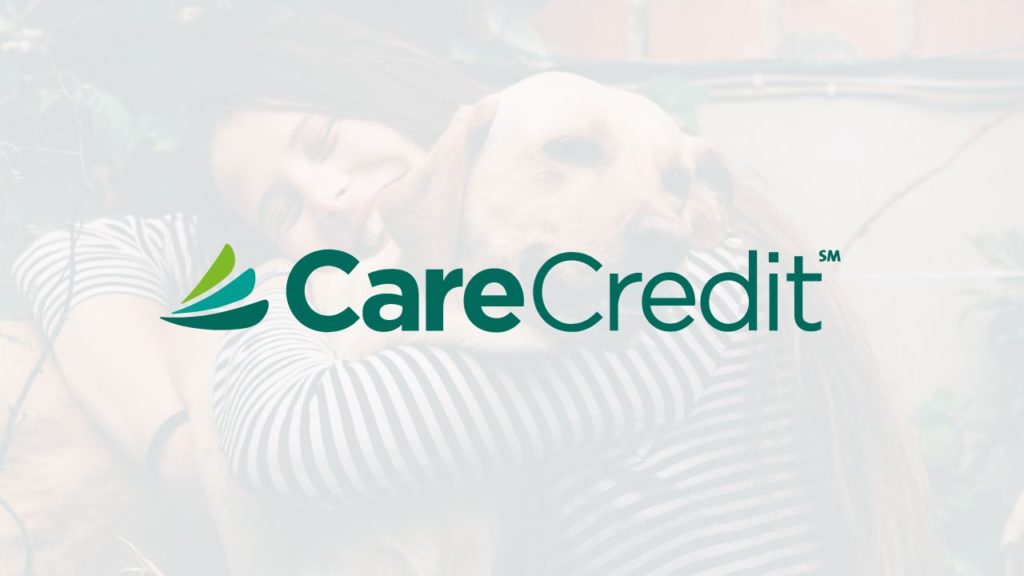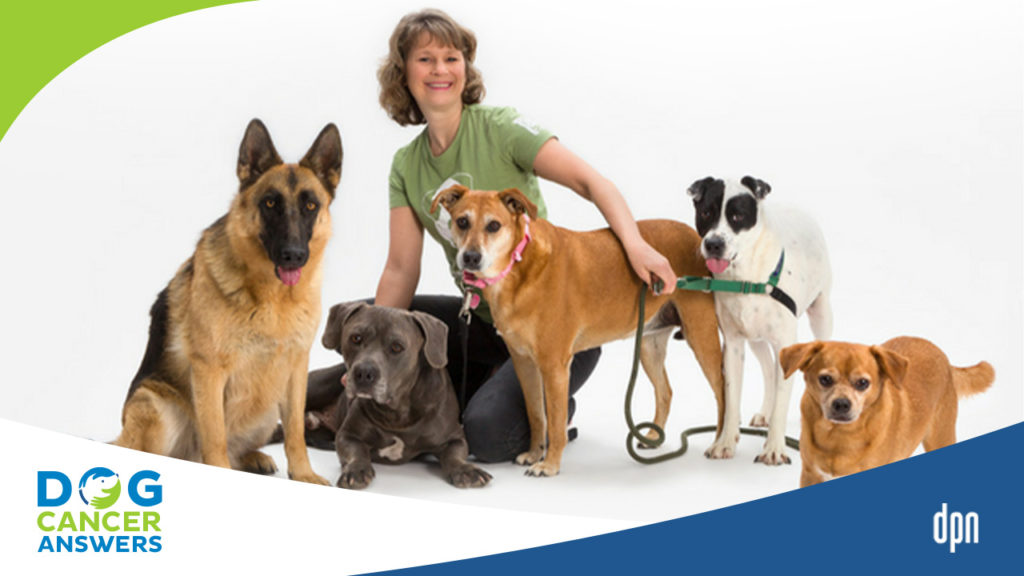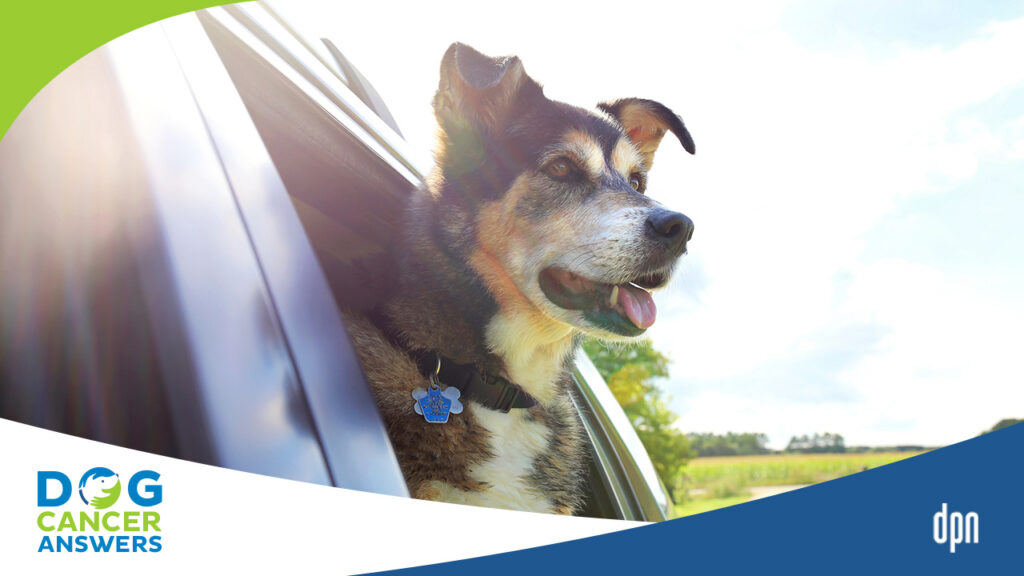EPISODE 150 | RELEASED January 17, 2022
FETCH a Cure: Financial Help for Dog Cancer | Joanne Silverman Deep Dive
FETCH a Cure is a unique organization that provides education and funding for dogs with cancer, and even brought veterinary radiation to Richmond, VA.
SHOW NOTES
FETCH a Cure was founded by Mike Holland, Tonie Stevens, and Ryan Traylor after Mike’s dog was diagnosed with osteosarcoma back in 2006. At that time there were few resources for dog cancer in the Richmond, VA area.
Since its humble beginnings as a back-room operation in a catering business, FETCH a Cure now provides continuing education opportunities for veterinarians, funding for dog cancer treatment within the Virginia-Maryland-DC area, and has even bought a building that now hosts both a veterinary oncology practice complete with a radiation room and a separate holistic veterinary practice.
One of the things that makes FETCH unique is that the organization asks that owners who benefit from their cancer treatment funding volunteer their time to help other dogs and owners get the assistance they need. Volunteering could consist of helping out at an event, hosting a fundraiser, or even delivering pamphlets to veterinary practices to spread the word.
FETCH a Cure currently only serves the Virginia, Maryland, and Washington DC area of the US, but they are looking to expand. They also have support groups that are open to dog lovers anywhere.
Links & Resources Mentioned in Today’s Show:
[00:00:00] >> James Jacobson: Today’s sponsor is The Dog Cancer Survival Guide, a must read book if your dog has cancer. To get a free excerpt on what to feed your dog, go to DogCancerDiet.com. You’ll get Dr. Demian Dressler’s Dog Cancer Diet and help your dog with their next meal. That’s DogCancerDiet.com to get an excerpt for free of The Dog Cancer Survival Guide.
[00:00:28] >> Joanne Silverman: A lot of times people come to us too late, you know? Um, and that’s just so frustrating. So we’ve been trying to get the word out more, especially like in Maryland. DC we get a lot from, but we’ve, you know, tried to be in front of as many veterinarians as possible so that they can refer their patients to us, and get on different websites and get the word out there.
[00:00:57] >> Announcer: Welcome to Dog Cancer Answers, where we help you help your dog with cancer. Here’s your host, James Jacobson.
[00:01:06] >> James Jacobson: Hello friend, and welcome to Dog Cancer Answers. Today’s episode is about FETCH a Cure. It’s a nonprofit organization dedicated to pet cancer awareness, education, and treatment.
And FETCH currently serves the Washington DC, Virginia, and Maryland areas, but they are constantly looking to expand their efforts and spread awareness and help more dogs with cancer and the owners who love them. And you know what is really cool about this organization? In exchange for helping to fund a dog’s cancer treatment, all that they ask is that the owners volunteer to help out with their efforts and fundraisers. To talk about FETCH, we are speaking with the executive director of the organization, Joanne Silverman. Joanne has been with FETCH for 14 years and she has seen it through some incredible expansions, including the purchase of a radiation facility. Yeah, a radiation facility in Richmond, Virginia. Joanne Sillerman. Thank you so much for joining us today.
[00:02:11] >> Joanne Silverman: Oh, I’m happy to be here. I appreciate you spreading the word about FETCH.
[00:02:16] >> James Jacobson: Well, FETCH a Cure is such an awesome resource. And we just learned about it, thankfully, because you are a subscriber to Dog Cancer News, and you reached out to our editor and said, hey, why don’t you list us as a financial resource for people who are going through dog cancer.
And I think we have corrected that. And we’re just so delighted to talk to you and learn more about it because cancer care can get awfully expensive. Right Joanne?
[00:02:47] >> Joanne Silverman: It certainly can. It certainly can. Yeah. We’ve, uh, we’ve been around about 15 years and we have a application process. We deal with any veterinarian you choose to go to, which, some other organizations do it a little different than we do, but we only ask for volunteer hours in return and typically fund 20 to 40% of the cost.
[00:03:17] >> James Jacobson: Well, let’s break that down a little bit. So what is the volunteer hours component of your program?
[00:03:22] >> Joanne Silverman: We ask people to volunteer any way they can. We have a checklist of about 20 things. Some they can do virtually wherever they are. We’re based in Richmond, but we are throughout the area kind of regularly.
[00:03:38] >> James Jacobson: So how far in the Mid-Atlantic do you go, will you fund?
[00:03:41] >> Joanne Silverman: We fund Virginia, DC and Maryland.
[00:03:44] >> James Jacobson: Okay. Okay.
[00:03:45] >> Joanne Silverman: Yeah.
[00:03:45] >> James Jacobson: So that that’s a lot.
[00:03:47] >> Joanne Silverman: It’s a lot.
[00:03:47] >> James Jacobson: And what’s the volunteer component, so if you receive some funding from FETCH a Cure?
[00:03:52] >> Joanne Silverman: We ask that you either do some sort of volunteer help. Most people do. Some don’t. It could be as easy as you know, uh, going out in your area and taking brochures of theirs to veterinary practices. It could be helping, we do, we’re very event heavy, especially in Richmond. So we always need volunteer help with that. We have another program which I can touch on called Pen Pals, so some people foster dogs or help us get auction items.
It’s a list of like 20 things. Sometimes it’s just calling someone else going through the program or going through the process and they want to talk to someone about how it’s going.
[00:04:41] >> James Jacobson: So how did FETCH get started?
[00:04:43] >> Joanne Silverman: It got started by a man named Mike Holland and two of his good friends. He was going through the process. 15 years ago, he had a Saint Bernard named Hannah. They gave her two weeks to live. She had osteosarcoma, so bone cancer. And at that time there was not even an oncologist in Richmond, um, more or less radiation. He tried everything holistically and some chemo from his regular vet and just wasn’t getting the answers, ended up going to DC for an oncologist.
And it was just, you know, he owned his own business so he could do what he needed to do to find help and to travel. So she lived for two years, very healthy. Um, radiation was a big component in that. Immunotherapy, which is now kind of front and center, but he did that back then. And in fact, we partnered with the practice that he started with – it’s different oncologists – and we actually brought radiation therapy to Richmond, Virginia.
So we took over basically a Bon Secours. I don’t know if y’all know Bon Secours, but it’s a, the major hospitals here. We took over an old Bon Secours radiation center and turned it into a veterinary cancer center.
[00:06:07] >> James Jacobson: So through Mr. Holland’s experience with his own dog, he made things better in central Virginia, and Richmond of course is the capital – we have listeners all over the world – so Richmond is the capital of Virginia and Virginia is a pretty, pretty big state.
[00:06:21] >> Joanne Silverman: Yeah.
[00:06:21] >> James Jacobson: So that was the genesis of FETCH a Cure.
[00:06:24] >> Joanne Silverman: Right.
[00:06:25] >> James Jacobson: But obviously you have some resources now. How big is your budget annually? You’re the executive director.
[00:06:31] >> Joanne Silverman: It’s about $500 to $700,000, depending on the year and the pandemic and whatever.
[00:06:39] >> James Jacobson: The pandemic affects all of us.
[00:06:40] >> Joanne Silverman: It does.
[00:06:41] >> James Jacobson: And where does that funding come from?
[00:06:44] >> Joanne Silverman: It comes from a lot of different sources. It comes from individuals, individual donors. It comes from foundations. It comes from sponsorships through veterinary practices. It comes through events. So Mike Holland has an event company and is a catering business.
So we kind of get thrown into event planning rather early and it’s grown tremendously, so.
[00:07:13] >> James Jacobson: That is a resourceful entrepreneur. I like that. And then, is this your full-time work, Joanne?
[00:07:19] >> Joanne Silverman: Oh yeah. And I’ve been here, FETCH has been around 15 years. I’ve been around 14.
[00:07:25] >> James Jacobson: Wow. Okay. So you go back to the bones of it.
[00:07:28] >> Joanne Silverman: I do.
[00:07:28] >> James Jacobson: In terms of people, when you review applications, is that an ongoing basis?
[00:07:35] >> Joanne Silverman: It is. It’s an ongoing basis. We accept them any time. We have a, we have a full medical veterinary board and some of them are on what we call a companions in crisis board. And three to four veterinarians, uh, review the cases and with their criteria, they decide who we can fund and who we can’t. We want to make sure there’s at least a four to six month life expectancy for us to fund.
[00:08:08] >> James Jacobson: Okay. What are some other criteria that you look for in evaluating applications?
[00:08:13] >> Joanne Silverman: Mainly it’s geographical, and it’s mostly whether the animal, like I said, can survive four to six months. Also, we do have to look forward to make sure, since we fund 20 to 40%, that they have some resources because it’s so expensive and things come up.
We will review an application for a second time after, I think it’s a four month, after they’ve gone through treatment four months, they can reapply for more funding.
[00:08:46] >> James Jacobson: And what percentage of applications do you approve or do you accept for funding?
[00:08:51] >> Joanne Silverman: It’s about 85%. I mean, it’s very high.
[00:08:55] >> James Jacobson: Okay. So at this point is the challenge to raise more revenue, more funds so that you can donate more, or is it to find people who are in need of financial support?
[00:09:07] >> Joanne Silverman: It’s really 50/50.
[00:09:10] >> James Jacobson: Both.
[00:09:10] >> Joanne Silverman: It’s really both. Yeah, it’s both. Because a lot of times people come to us too late, you know? Um, and that’s just so frustrating. So we’ve been trying to get the word out more, especially like in Maryland. DC, we get a lot from, but we’ve, you know, tried to be in front of as many veterinarians as possible so they can refer their patients to us, and get on different websites and get the word out there, and social media, you know, is great for this.
[00:09:46] >> James Jacobson: And imagine you apply through your website, and we’ll put a link in the show notes, how difficult is the application process? You said there are two parts.
[00:09:54] >> Joanne Silverman: There’s two parts, one for the applicant. And then one for the treating veterinarian, which is really important to get, because that’s where all the what’s been done, um, we need a confirmed case of cancer. It can’t just be they think it’s cancer. We need some sort of diagnosis.
[00:10:15] >> James Jacobson: So that means the cytology reports?
[00:10:17] >> Joanne Silverman: Sometimes. Yeah. Cytology, or sometimes it’s a CT scan. It just depends on the type of cancer. Blood work.
[00:10:25] >> James Jacobson: And so often time is of the essence. How long does this application process take?
[00:10:30] >> Joanne Silverman: This is gonna shock you because it’s just amazing. We usually turn it around about 24 hours.
[00:10:36] >> James Jacobson: Wow.
[00:10:36] >> Joanne Silverman: It’s amazing.
[00:10:37] >> James Jacobson: It’s quicker than cytology.
[00:10:38] >> Joanne Silverman: Yes. Yes. I would say it’s regularly 48 hours. But our veterinarians are very committed to us and you know, it’s a priority. I mean, we can have big events going on, or whatever we’re doing, but it’s a priority.
[00:10:56] >> James Jacobson: And then who does the approving, you said there’s a medical board?
[00:10:59] >> Joanne Silverman: It’s a medical, a veterinarian board. It’s um, three to four. We have some in Virginia, some in Maryland. There was one in DC. So.
[00:11:10] >> James Jacobson: And composed of, of oncologists, or veterinarians, or?
[00:11:13] >> Joanne Silverman: It’s both. So we always have at least one or two veterinary oncologists on that board, but we do have, you know, just veterinarians as well.
[00:11:22] >> James Jacobson: And you say, you fund somewhere between 20 and 40%, how do you determine how much is funded?
[00:11:27] >> Joanne Silverman: It’s based on income.
[00:11:28] >> James Jacobson: Okay.
[00:11:28] >> Joanne Silverman: It’s based on the client’s income level.
[00:11:31] >> James Jacobson: Okay. And then if you’re in the 15% and not accepted, you can reapply.
[00:11:37] >> Joanne Silverman: You can reapply if things change or, or if you need more funding.
[00:11:43] >> James Jacobson: And this volunteer component is such an awesome thing. It’s sort of like, you know, pay it forward.
[00:11:47] >> Joanne Silverman: Right.
[00:11:48] >> James Jacobson: What are some of the things you mentioned, you know, putting flyers out, but what are some of the more interesting things that people have done with their volunteer commitment?
[00:11:57] >> Joanne Silverman: They will do, especially if they are not geographically near us, they will do like a fundraiser in their own area. Like a give back night at a brewery or a restaurant. I mean, we try to, we’ve always tried to make, have fun things, dealing with what dealing with cancer most of the time. They can do that. Like I said, we’re event heavy. So we need a lot of volunteers for that. We do a dog walk, so we try and get people help with set up and break down and finding, you know, vendors and sponsors.
We also do, since Mike’s dog Hannah had osteosarcoma, we started, or he started right in the beginning, a really cute program, it’s called Holiday Bone Treats. We’re actually doing that now. And it’s bone for bone cancer.
[00:12:54] >> James Jacobson: Right.
[00:12:55] >> Joanne Silverman: And they’re dog treats in a little package. I should grab one in a minute. They’re the treat, and then we kind of customize a label for the practices or businesses that have sponsored these, and then inside we have the warning signs of cancer, and on the back, it’s a, a little card about osteosarcoma. So we have volunteers help stuff them, and they’re kind of parties. We, you know, we’ll, we’ll have a little beer and wine and we’ll all stuff these, I mean, it’s thousands of them.
[00:13:29] >> James Jacobson: That is so cool. I so really appreciate the social component as someone who grew up in Virginia and maybe partied a little bit in central Virginia when I was there. I appreciate how you’ve created that balance. FETCH a Cure isn’t just focused on dogs with cancer though. You, tell me a little bit about that Pen Pals project with the Department of Corrections.
[00:13:50] >> Joanne Silverman: Pen Pals is really interesting.
Um, I do want to tell you one other thing located though, with the cancer side of things.
[00:13:57] >> James Jacobson: Sure.
[00:13:57] >> Joanne Silverman: So from the beginning we started a, it’s called a Steel Dog Project. So like, in many areas, I think there were the cows in Chicago, it was fish in Richmond. These are big steel dogs and-
[00:14:16] >> James Jacobson: I’ve seen the cows. Okay. So you, you have – how large is a steel dog?
[00:14:21] >> Joanne Silverman: So we have a couple of sizes. The main size is about four feet tall and it’s out of steel. And when folks sponsor us, or they buy them at auction, and put them, like a lot of restaurants all around here have them and businesses have them. And the thought is it’s awareness, and not just a cool art project, that when people see it, they think about canine cancer.
Now we, you know, we’ve grown, and so many of our sponsors have them. We do like six foot ones and we do them at dog parks.
[00:14:59] >> James Jacobson: That is so cool. How much does it cost to adopt a steel dog?
[00:15:04] >> Joanne Silverman: It’s about $3000, including like to have it painted or wrapped or whatever you want. So it’s, it’s cool. We get local art – with that, we pay local artists to do it for the business, or the park, or whomever.
[00:15:19] >> James Jacobson: I imagine there’s a gallery of all of the steel dogs who have made their way around.
[00:15:24] >> Joanne Silverman: We are trying. We, uh, we’d love to do a book, and we talked about it, but you know.
[00:15:30] >> James Jacobson: You have pictures on your website?
[00:15:31] >> Joanne Silverman: Yeah, we do.
[00:15:32] >> James Jacobson: Okay. We will put a link to that. That is really cool. And again, are these steel dogs mainly in central Virginia, the DC, Maryland, Virginia area, or?
[00:15:41] >> Joanne Silverman: Definitely mainly, but every now and then – I know one of in Pennsylvania, people will move and then send us pictures.
Like it’s one on top of a hill. We have one sponsor who’s fantastic, and he gets one every year. And they’re very cool. And he will like donate one to a national park, like in Virginia, like the hiking, and he’ll, he’ll kind of like put it out to pasture in one of these great parks, which is really fun.
And, um, we had one person who used to own a great little like cupcake shop here, and dog bakery, and she moved to Belize. So she sent us a picture of her dog down there. So it’s been fun, but I didn’t want to not talk about that ’cause it’s such a cool project.
[00:16:29] >> James Jacobson: No, I, I am fascinated and we will share that because I think that may even make it onto a future episode of one of our other shows at Dog Podcast Network called Dog Edition because that’s the kind of thing that is pretty cool. And I’d love to see how far – Belize sounds good. I’d love to see how far these dogs can go. If someone wants to adopt a steel dog and help benefit FETCH a Cure, I guess that’s just done through your website.
[00:16:53] >> Joanne Silverman: Yes. Just contact one of us.
[00:16:55] >> James Jacobson: That’s cool.
[00:16:56] >> Joanne Silverman: Yeah.
[00:16:56] >> James Jacobson: So let’s go back to the prison project, or Pixie’s Pen Pals. You guys have great names, Pen Pals, and then penitentiary. What is that about?
[00:17:05] >> Joanne Silverman: So that was an interesting addition because we’ve, always have been about cancer and education, we do CE courses for veterinarians. It’s always been about that. About 10 years ago, we were approached by someone who, their sister had started, who was Pixie, started Pixie’s Pen Pals. It was like, from what I can tell, the third or fourth prison dog training program in the country, I mean, it went way back. She passed away suddenly of cancer, and they were looking for someone to take this over, and she came to us and I’m like, you know that’s not really what we do.
That’s not our mission, I’ve never been in a prison. But it felt like such a great program, and it’s funded by the Department of Corrections, so I went and sat in on a couple of lessons there – and it’s in three prisons in Virginia, one in Fluvanna, near Charlottesville, is the women’s prison – and, just blown away.
So, got a couple of board members to go with me, and it was just too good a project to let it go by the wayside or not to take it. So we kind of put it in with their mission of, you know, helping dogs and helping dogs help people. And, um, it’s been going on ever since. It was on hiatus during COVID, obviously, and, and now I’ve gotten like two new prisons that are very interested in starting it.
So we’re hoping to get back in the prisons in January, February. So it’s, usually it’s only inmates that have a spot free record and have just stellar, you know, situation. Um, we typically, the prisons we look at, we want people that are there for a long time, so they can be a good trainer. And each dog has two inmate handlers, a primary and secondary.
And we provide everything they need, and medical care, and, and we hire, we have a fantastic trainer, and she goes in once a week and basically conducts training slash therapy sessions, which lasts two to three hours, for the inmates and their dogs. And they have homework, they have books to read, we sometimes get special permission for them to watch films,
they’re tested on it. And, you know, we intermittently will take out the dogs if we have an event that we can bring them to, to kind of show them off and let them find homes. And it’s amazing. And they stay there until they’re adopted.
[00:20:00] >> James Jacobson: And how long can that be? How long do, do dogs stay in the pen?
[00:20:03] >> Joanne Silverman: Well most dogs are there – the training, they need at least two months, two to three months, um, to just kind of get basic manners. But I will tell you, we, Quinn, we have one dog who has been adopted twice and it didn’t work out, and he now lives forever in Buckingham County. They love him there. And we still provide food and everything he needs, but, he does great in the prison, but he just could never find the right home.
But that’s unusual. Most of them, you know, they can’t be real big dogs. It’s somewhat breed restrictive. So typically not a dog over 50 pounds.
[00:20:45] >> James Jacobson: Do they live in the cell?
[00:20:47] >> Joanne Silverman: They live in the cell.
[00:20:47] >> James Jacobson: With one of the primary or the secondary?
[00:20:50] >> Joanne Silverman: Both of them. They’re all in one cell. And so that’s why we can’t have larger dogs ’cause it’s not much room.
[00:20:56] >> James Jacobson: Right.
[00:20:57] >> Joanne Silverman: Everything has to be approved. Every little treat, every little, you know, leash, every little thing you can imagine. It’s very restrictive.
[00:21:09] >> James Jacobson: What has the Department of Corrections, what has been their response to this program?
[00:21:13] >> Joanne Silverman: They love it. Love. They keep renewing. We have like every year, it’s a two year contract and we just got renewed for another two years.
They love it. They’ve put it out for other facilities to take advantage of it.
[00:21:27] >> James Jacobson: Is anyone else doing this in the country?
[00:21:29] >> Joanne Silverman: They are. They are, there are some definitely some great prison dog programs out there. There have been a lot like in the last probably five or six years, and they’re all kind of, have a different little spin on it, but it’s amazing.
We, I’ll tell you a funny story. So I had a few dogs that thankfully lived a long time. So when we decided, you know, it was time to get another dog, of course, Pen Pals, I wanted to get a Pen Pals dog. And we have fostered. We, you know, we’ll take them out. So my daughter and I, we looked and she picked out a dog from Lunenburg and, I probably wouldn’t have picked that dog, but, and then it was time.
So also a really neat piece of this is when you adopt the dog, you have a full hour lesson with the trainers and they tell you exactly the idiosyncrasies of these dogs, and what they like, and what they don’t like, and what they’re good at, what they’re not. And, along with pages and pages of their like, diary they keep on these dogs.
And I’ve been in and out of all the prisons, you know, regularly.
[00:22:42] >> James Jacobson: You’ve gotta be careful how you say that.
[00:22:45] >> Joanne Silverman: Yeah I know. In this context! And my daughter was 18, I think, or, yeah, I think she was 18 at the time. I had to really think about taking my young daughter into a men’s prison. And they’re all the highest level of security.
[00:22:59] >> James Jacobson: It’s not minimum security.
[00:23:01] >> Joanne Silverman: Yes. And I had to really, it took me back, and she was like, yeah, I’m going.
I want to go, I want to do the lesson. And, um, we did. And this dog is, you know, not to have favorites, but he is my favorite.
[00:23:15] >> James Jacobson: Very obedient. Very well-trained.
[00:23:17] >> Joanne Silverman: He, he’s pretty good. He’s pretty good. He, believe me, he’s got a big personality. But what was funny is because we had another dog at the time and I have a cat, we took him out.
I wanted to take him out for the weekend to make sure he would fit with everybody. And he wasn’t finished his training, so I just wanted to take him out for the weekend and take him back. And our Pen Pals manager at the time handled that for me, and got a volunteer to pick him up and bring him. But, you know, that inmate, this was the first dog he had ever trained. And he had his mother call, you know, our manager of Pen Pals who works for me, and wanted to make sure he was in a safe home, and that he was coming back, and that it wasn’t anyone that would do him any harm. And she’s like, no, you should feel quite all right. He’s in a safe place. We’ve never had that from anyone else. But when I decided to take one out for the weekend. And, um, he was awesome and we put him back in to finish his training and then went for the lessons, and that was about five years ago.
[00:24:26] >> James Jacobson: What a win-win.
[00:24:27] >> Joanne Silverman: Yes, totally win-win.
[00:24:29] >> James Jacobson: Joanne, that is awesome. I want to talk a little bit about your pet loss support group. We’re going to take a break, but when we come back, we’re gonna change it a little bit, get back on cancer and the support group that you have for people who are dealing with the loss of a pet. We’ll be right back.
We’re speaking with Joanne Silverman. Joanne, FETCH a Cure does so many great things. Not only donating money and helping with this incredible Pen Pals project with the prison population and dogs, but also support groups, because obviously anyone who is dealing with cancer may eventually have to deal with the loss of a pet.
And you have these in-person and Zoom support groups.
[00:25:15] >> Joanne Silverman: We do, we do. We started it right before the pandemic. They were very well attended. We have a psychologist who had done these before –
[00:25:26] >> James Jacobson: Dr. Greenberg.
[00:25:27] >> Joanne Silverman: Dr. Greenberg. We hired her on and for a while it was just through Zoom, but now they’re back in person and Zoom.
So we have some come in person, which is really amazing, and it really reminds you how big that loss is. And it’s been a great thing. It’s also been great to virtually be able to connect with people all over the country and-
[00:25:54] >> James Jacobson: What’s the format for the support group?
[00:25:56] >> Joanne Silverman: It’s really, Dr. Greenberg kind of talks about her background and why she’s got into this, and it was of course losing her dog, and then she really leaves it open for whatever people want to say. And it’s really, you’d be surprised how it’s not a quiet, you know, group. They’re there – if they come in person or take the time to Zoom in, they want to talk and they want to understand in any way that people have to get through this.
Such, just such a hard thing. And the pet cancer support group is really quite fascinating and that we really get people from all over. A lot of Canadians also Zoom into that. But it’s all the different treatments people are trying. So, and there’s so many different types of cancer. It’s really fascinating.
The last one I did – we kind of take turns around here so not one person, it’s a lot to do on your own, so we take turns – the people that, you know, were asking, can you share everyone’s email on this call if we all agree, because we’d really like to talk more. And they all agreed, and we shared it and they keep up and, it’s just, helps knowing people are all going through the same thing, and-
[00:27:22] >> James Jacobson: It is, it’s such an important thing to know that you’re not alone when you’re dealing with pet cancer. We have a support group at DogCancerSupport.com, which is a very vibrant community on Facebook of people who are going through dog cancer and being able to connect with others is so critical.
And, uh-
[00:27:39] >> Joanne Silverman: Right.
[00:27:39] >> James Jacobson: The virtual nature of it, of course, is that it’s 24/7.
[00:27:43] >> Joanne Silverman: Right.
[00:27:43] >> James Jacobson: You know, people can reach into their pocket and connect and it’s kind of nice.
[00:27:46] >> Joanne Silverman: It is.
[00:27:47] >> James Jacobson: So Joanne, what is next for FETCH a Cure?
[00:27:50] >> Joanne Silverman: Oh, what’s next. I think really to get our word out more. We’d love if we get to the point of including, you know, more areas to provide funding.
I told you a little bit about our building, which we’ve expanded that, and have different veterinary practices here. We just did kind of an addition. So that’s been our project.
[00:28:16] >> James Jacobson: I didn’t get that. So where you’re headquartered is also, is that also the radiation?
[00:28:21] >> Joanne Silverman: It is.
[00:28:21] >> James Jacobson: The veterinary clinic. I get it.
[00:28:23] >> Joanne Silverman: It is. So it’s also the oncology service, which is part of Ethos, which you may know, they were at a different practice somewhere else in town, and they’re all over the country. And they moved their whole practice, which is a staff of 25, they, so we bought this building and they’ve built out the rest of the space.
[00:28:46] >> James Jacobson: Wow. So it’s a pretty big facility there.
[00:28:48] >> Joanne Silverman: It’s huge.
It’s a huge-
[00:28:50] >> James Jacobson: On Staples Mill Road.
[00:28:51] >> Joanne Silverman: It is. It’s a huge facility.
We also have another holistic veterinary practice that’s here also that does chiropractic work and acupuncture and all sorts of things.
[00:29:04] >> James Jacobson: Wow. An amazing resource, if you live in or near central Virginia.
[00:29:09] >> Joanne Silverman: Absolutely.
[00:29:09] >> James Jacobson: And you guys are doing such amazing work. I’m so delighted that we got to chat today, Joanne. And, um, anything you’d like to leave us with?
[00:29:19] >> Joanne Silverman: No, I just appreciate the time and getting with us and spreading the word about FETCH and all that you do about dog cancer and all that entails.
[00:29:30] >> James Jacobson: Well, thank you, Joanne. And thank you for joining us today on Dog Cancer Answers. If you’d like any of the links that we talked about, please check out the show notes where we have all those links or visit our website at DogCancerAnswers.com. I’m James Jacobson. On behalf of all of us here at Dog Podcast Network, I want to wish you and your dog, a very warm Aloha.
[00:29:53] >> Announcer: Thank you for listening to Dog Cancer Answers. If you’d like to connect, please visit our website at DogCancerAnswers.com or call our Listener Line at (808) 868-3200. And here’s a friendly reminder that you probably already know: this podcast is provided for informational and educational purposes only. It’s not meant to take the place of the advice you receive from your dog’s veterinarian.
Only veterinarians who examine your dog can give you veterinary advice or diagnose your dog’s medical condition. Your reliance on the information you hear on this podcast is solely at your own risk. If your dog has a specific health problem, contact your veterinarian. Also, please keep in mind that veterinary information can change rapidly.
Therefore, some information may be out of date. Dog Cancer Answers is a presentation of Maui Media in association with Dog Podcast Network.
Hosted By
SUBSCRIBE ON YOUR FAVORITE PLATFORM
Topics
Editor's Picks
CATEGORY









